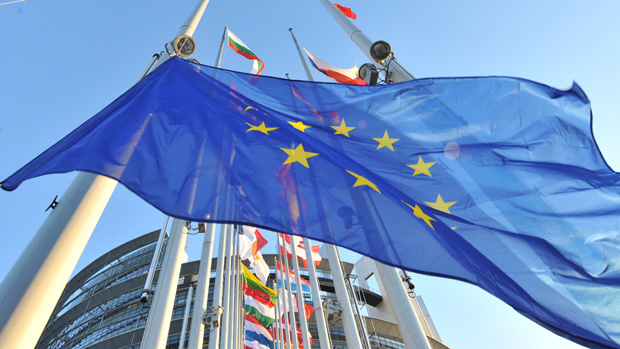Why Nigel Lawson wants Britain to leave Europe
Thatcher's Chancellor says EU is a 'bureaucratic monstrosity' with 'contempt' for democracy

A free daily email with the biggest news stories of the day – and the best features from TheWeek.com
You are now subscribed
Your newsletter sign-up was successful
MARGARET THATCHER'S chancellor Lord (Nigel) Lawson has called for Britain to leave the European Union. In a 2,000-word essay for The Times, Lawson quotes Keynes to explain why he will vote 'no' in any forthcoming referendum on the UK's EU membership - "When the facts change, I change my mind". Here are Lawson's five reasons why Britain should quit:
Things can't only get better: David Cameron has already embarked on "preliminary" talks with fellow EU members to help renegotiate improved terms for Britain, as former prime minister Harold Wilson did before the 1975 referendum. But Lawson argues any changes the prime minister can secure ahead of a proposed 2017 in/out vote will be "inconsequential" and "trivial".
The United States of Europe: Lawson argues that the EU "project" has a clear purpose – to create a federal European super-state. Such an objective does not just demonstrate the EU's contempt for democracy, it is also "profoundly misguided" and not in the British interest.
The Week
Escape your echo chamber. Get the facts behind the news, plus analysis from multiple perspectives.

Sign up for The Week's Free Newsletters
From our morning news briefing to a weekly Good News Newsletter, get the best of The Week delivered directly to your inbox.
From our morning news briefing to a weekly Good News Newsletter, get the best of The Week delivered directly to your inbox.
The euro makes things worse: The advent of the euro has "fundamentally changed" Britain's position in the EU. Monetary union among 17 out of 27 EU member states means the UK and others are becoming increasingly marginalised and are doomed to being consistently outvoted by the eurozone bloc. British business needs global challenges: The trade advantages of being in the single market are marginal, says Lawson, but British industry feels too "secure" in the EU instead of looking at export opportunities in the developing world. Leaving an institution that has achieved its historic purpose and is now "past its sell-by date" could force a much-needed change of focus.
A major economic plus: Aside from saving £8 billion per year on the UK's membership fee, Lawson argues there is another clear economic benefit to leaving the EU: the City will gain from being outside the "frenzy of regulatory activism". Rather than damaging our economy, an escape from the EU's "mandatory nonsense" would be a major economic plus for Lawson, who argues that the financial transaction tax and the EU's other regulatory efforts are motivated by a jealous desire to cut London down to size and partially by "well-intentioned ignorance".
A free daily email with the biggest news stories of the day – and the best features from TheWeek.com
-
 Alexei Navalny and Russia’s history of poisonings
Alexei Navalny and Russia’s history of poisoningsThe Explainer ‘Precise’ and ‘deniable’, the Kremlin’s use of poison to silence critics has become a ’geopolitical signature flourish’
-
 Are Hollywood ‘showmances’ losing their shine?
Are Hollywood ‘showmances’ losing their shine?In The Spotlight Teasing real-life romance between movie leads is an old Tinseltown publicity trick but modern audiences may have had enough
-
 A dreamy long weekend on the Amalfi Coast
A dreamy long weekend on the Amalfi CoastThe Week Recommends History, pasta, scenic views – this sun-drenched stretch of Italy’s southern coast has it all
-
 How corrupt is the UK?
How corrupt is the UK?The Explainer Decline in standards ‘risks becoming a defining feature of our political culture’ as Britain falls to lowest ever score on global index
-
 The high street: Britain’s next political battleground?
The high street: Britain’s next political battleground?In the Spotlight Mass closure of shops and influx of organised crime are fuelling voter anger, and offer an opening for Reform UK
-
 Is a Reform-Tory pact becoming more likely?
Is a Reform-Tory pact becoming more likely?Today’s Big Question Nigel Farage’s party is ahead in the polls but still falls well short of a Commons majority, while Conservatives are still losing MPs to Reform
-
 Taking the low road: why the SNP is still standing strong
Taking the low road: why the SNP is still standing strongTalking Point Party is on track for a fifth consecutive victory in May’s Holyrood election, despite controversies and plummeting support
-
 What difference will the 'historic' UK-Germany treaty make?
What difference will the 'historic' UK-Germany treaty make?Today's Big Question Europe's two biggest economies sign first treaty since WWII, underscoring 'triangle alliance' with France amid growing Russian threat and US distance
-
 Is the G7 still relevant?
Is the G7 still relevant?Talking Point Donald Trump's early departure cast a shadow over this week's meeting of the world's major democracies
-
 Angela Rayner: Labour's next leader?
Angela Rayner: Labour's next leader?Today's Big Question A leaked memo has sparked speculation that the deputy PM is positioning herself as the left-of-centre alternative to Keir Starmer
-
 Is Starmer's plan to send migrants overseas Rwanda 2.0?
Is Starmer's plan to send migrants overseas Rwanda 2.0?Today's Big Question Failed asylum seekers could be removed to Balkan nations under new government plans